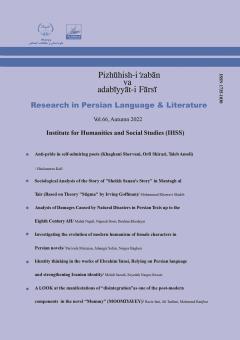Identity thinking in the works of Ebrahim Yunsi, Relying on Persian language and strengthening Iranian identity
Subject Areas : Research in Iranian classical literatureMehdi Saeedi 1 * , Seyedeh Narges Rezaie 2
1 - Assistant Professor, Department of Persian Language and Literature, Institute of Humanities and Social Sciences, IHSS, Iran.
2 - Assistant professor of Persian language and literature, Payame Noor University.
Keywords: Ebrahim Yunsi, Iranian identity, Ethnic identity, Persian language, Kurdish language.,
Abstract :
identities and Iranian identity has been on the border between alignment, contradiction, conflict and rupture. Political and social narratives of the issue of Iranian identity and its elements are effective in weakening or strengthening this relationship. Among the three nationalistic, modern, postmodern and historical narratives, it is the only historical narrative that pays attention to the maximum consolidation and unity of Iran and Iranians by avoiding excess and exaggeration in explaining the problem. Ebrahim Yunsi, a political activist, translator and writer of Iranian Kurdish descent, is the author of several works in Persian. Some of what he translated is about Kurdish cultural and political history and contemporary political events. In the introduction or footnote of most of the translations, he pays attention to the relationship between Kurds and Iran, and in a way of Focusing on identity between Kurds and Iran, he establishes an aligned and consistent relationship. Also, in his works, he criticizes the opinion of writers who have highlighted some of the elements of ethnic identity in order to weaken Iranian identity, or who believe in the distinction and separation between ethnic identity and Iranian identity. He is especially aware of the role and function of the Kurdish language and the Persian language. Therefore, in spite of his primary political affiliation or contrary to what some political parties think, he believes that there is an equal relationship between the Kurdish language and the Persian language. Therefore, he uses the Persian language to write and tries to increase the richness of the Persian language and its lexical and cultural treasure in his works by using a lot of words and what is Kurdish knowledge and language. In this article, by analyzing the introductions of the translations and paying attention to the linguistic issues of the stories, this aspect of the identity in opinion of Ebrahim Yunsi has been discussed.
آژند، یعقوب (1369) «وضع ادبیات داستانی در قبل و بعد از انقلاب»، در: مجله سوره، دوره دوم، شماره دوازدهم ص12تا16.
احمدی، حمید (1379) هویت و قومیت در ایران، تهران، نشر مرکز.
احمدی، حمید (1384) «دین و ملیت در هویت ایرانی»، در: مجله دانشکده حقوق و علوم سیاسی دانشگاه تهران، شماره 67.
احمدي، حميد (1382)«هویت ملی ایرانی: بنیادها، چالشها و بایستهها»، در: نامه پژوهش فرهنگی (فصلنامه تحقیقات فرهنگی)، سال هفتم، دوره جدید، شماره 6.
ادموندز، سیسیل جان (1382) کردها، ترکها و عربها، ترجمۀ ابراهیم یونسی، تهران، روزبهان.
اشرف، احمد (1373) «هويت ايراني»، در: فصلنامه گفتوگو، ش 3.
اشرف، احمد (1374) «بحران هويت ملي و قومي در ايران»، در: ايراننامه، سال دوازدهم.
اشرف، احمد (1393) هویت ایرانی؛ از دوران باستان تا پایان پهلوی، ترجمه و تدوین حمید احمدی، تهران، نشرنی.
پهلوان، چنگیز (1371) «زبان فارسی و توسعه ملی»، در: ایران نامه، سال هفتم، شماره سوم.
توکلی، خالد (1396) «آسیبشناسی جنبش ملی کرد از دیدگاه ابراهیم یونسی»، در: شناختنامۀ ابراهیم یونسی، تهران، نگاه.
حاجیانی، ابراهیم (1387) «نسبت هویت ملی با هویت قومی در میان اقوام ایرانی»، در: جامعهشناسی ایران، دوره نهم، شماره 3و 4.
سپانلو، محمدعلی (1359) «گزارش یکساله داستاننویسی ایران»، مجله آینده، سال ششم، شماره 3 و 4.
سپانلو، محمدعلی (1376)، «داستاننویسی معاصر؛ مکتبها و نسلهایش»، آدینه، ش 121 و 122، آبان 1376، ص 62-64.
شایگان، داریوش (1380) افسونزدگی جدید: هویت چهل تکه و تفکر سیار، ترجمه فاطمه ولیانی، تهران، نشر و پژوهش فرزان روز.
شیری، قهرمان (1383) «ویژگیهای اقلیمی در داستاننویسی کرمانشاه»، کتاب ماه ادبیات و فلسفه، اردیبهشتماه.
شیری، قهرمان (1389)، «پیشدرآمدی بر مکتبهای داستاننویسی در ادبیات معاصر ایران»، دانشکده ادبیات و علوم انسانی دانشگاه تبریز، شماره 189.
شیری، قهرمان، (1387 ) مکتبهای داستاننویسی در ایران، تهران، نشر چشمه.
صادقی¬شهپر، رضا (1389) «نخستین رمان اقلیمی در داستان نویسی معاصر ایران» در: کتاب ماه ادبیات، شماره 40، ص35-39.
صادقیشهپر، رضا (1391) «حوزههای پنجگانة اقلیمینویسی در ادبیّات داستانی معاصر ایران»، در: پژوهش زبان و ادبیّات فارسی، ش 27، ص 99-124.
صادقي¬شهپر، رضا (1397) اقلیم داستان، داستانهای اقلیمی و روستایی ایران، تهران، نشر ورا.
قمری، محمدرضا و محمد حسنزاده (1389) «نقش زبان در هویت ملی»، در: زبانپژوهی، شماره سوم، ص153-172.
کوچرا، کریس (1373) جنبش ملی کرد، ترجمه ابراهیم یونسی، تهران، نگاه.
مسكوب، شاهرخ (1373) هويت ايراني و زبان فارسي، تهران، فرزان روز.
ميرعابديني، حسن (1368) صد سال داستاننويسي ايران، (ج 1)، تهران، تندر.
ميرعابديني، حسن (1377) صد سال داستاننويسي ايران، (ج 3)، تهران، چشمه.
ميرعابديني، حسن (1383) صد سال داستاننويسي ايران، (ج 4)، تهران، چشمه.
نصر، سیدحسین (1388) «زبان فارسی و هویت ملی»، در: فصلنامۀ شورای گسترش زبان و ادبیات فارسی، فصلنامۀ فروزش، شمارۀ دوم، بهار، ص92 تا 98.
نظری، زینب و همکارن (1399) «بازتاب عناصر اقلیمی در داستانهای ابراهیم یونسی» در: مجله زبان و ادب فارسی، شماره241.
ورزنده، امید و سیدشجاع نینوا، (1397) شناختنامه ابراهیم یونسی، تهران، نگاه.
همتی، ماندانا (1378) زبان و هویت فرهنگی، مجموعة فرهنگ و جامعهشناسی، شمارة 1.
هوشمند، احسان (1383) «کرد یا کردها، مدخلی جامعهشناختی بر کردشناسی»، در: مجله گفتگو، شماره 40، ص9-22.
یونسی ابراهیم (1375) دعا برای آرمن، تهران: نشر پانیذ.
یونسی، ابراهیم (1379) کج کلاه و کولی، تهران، نشر پانیذ.
یونسی، ابراهیم (1380) دادا شیرین، تهران، انتشارات نگاه.

